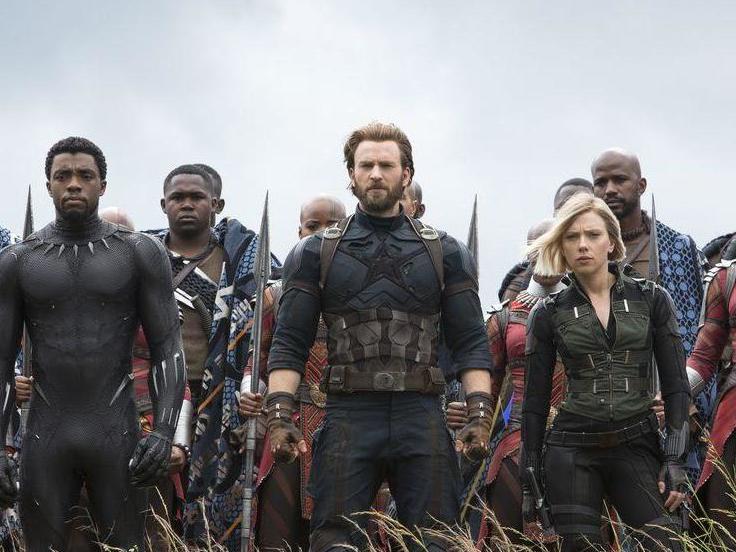Martin Scorsese is right about Marvel films – they are formulaic fairground rides, not cinema
The director’s comments might not have caused such outrage a few years ago, writes Caspar Salmon, but the critical establishment has since been shanghaied into considering this factory product as legitimate art


Your support helps us to tell the story
From reproductive rights to climate change to Big Tech, The Independent is on the ground when the story is developing. Whether it's investigating the financials of Elon Musk's pro-Trump PAC or producing our latest documentary, 'The A Word', which shines a light on the American women fighting for reproductive rights, we know how important it is to parse out the facts from the messaging.
At such a critical moment in US history, we need reporters on the ground. Your donation allows us to keep sending journalists to speak to both sides of the story.
The Independent is trusted by Americans across the entire political spectrum. And unlike many other quality news outlets, we choose not to lock Americans out of our reporting and analysis with paywalls. We believe quality journalism should be available to everyone, paid for by those who can afford it.
Your support makes all the difference.The non-feud between Martin Scorsese and Marvel fans continues apace. To recap: this is the brain-melting scoop that Scorsese, the venerable director who lists Kenji Mizoguchi’s Ugetsu Monogatari and Luchino Visconti’s Il Gattopardo among his favourite films, isn’t particularly keen on films about action figures going bang bang in the sky.
“That’s not cinema,” observed Marty in an interview with Empire last week, on the subject of Marvel movies. “The closest I can think of them, as well made as they are, with actors doing the best they can under the circumstances, is theme parks.” His comment might not have caused such outrage a few years ago, but the critical establishment has since been shanghaied into considering this factory product as legitimate art. It isn’t sufficient for admirers of Marvel that their expensive supernatural soap opera dominates the box office at the expense of original content, but this stuff must also now be treated with due respect. Outlets giving five stars to, say, Lucrecia Martel’s Zama, are required to dispense a sweet five to “Avengers 18: The Goodies Win Again”. Film critics around the world know that to talk down one of the Marvels, or reveal one of their many inane plot developments, is to be met with a deluge of vilification from incensed stans.
So the so-called “debate” carries on between, in one corner, a cinephile who considers cinema a hallowed art form, and, in the other, those who are not content to simply enjoy the entertainment value of the Marvel movies, but demand they be seen as part of the canon. Little matter that there are already notable public defenders of these movies – Barry Jenkins, director of Moonlight, tweeted his love of Avengers: Endgame earlier this year, saying, “[directors] the Russo Bros are so fundamentally sound in the way they communicate spatial relationships between characters during set-pieces”. (We’ll have to agree to disagree there – the central battle in Captain America: Civil War, for instance, is geographical pandemonium, cross-cutting between separate locations at breakneck speed in a way that fully muddies the drama at hand.) Scorsese has found an unlikely ally in Jennifer Aniston, though, who commented that good roles are “diminishing” with the rise of Marvel, adding that she is “not that interested in living in a green screen”.
It’s worth mentioning that to many people, Marvel is a pioneer of onscreen diversity, with its successes for female-led Captain Marvel and the black cast of Black Panther; this writer would argue that those victories are a sop to appease audiences while Marvel puts the sort of work made by minorities and women out of business, but that’s another matter. What’s more, calling these films formulaic is not so much an insult as a statement of fact. Marvel has hit on a formula to make film as product, which all but proofs these movies against failure. The films cleave to a fairly rigid aesthetic and a completely rigid storytelling model. A big battle sequence is followed by downtime, some high jinks, a lot of quipping, some fan-pleasing scenes between beloved figurines – whoops, sorry, I mean characters – and then a final big battle uniting all the fan favourites. Scorsese’s parallel of fairground rides is wholly appropriate for this type of entertainment.
Amusingly, what one might consider “real” cinema according to Scorsese’s definition – a cinema that tells stories to mine the human psyche, say – has now been crossed with the franchise film. Joker has made bank at the US box office by featuring a beloved comic book character, but treating him in the mode of Scorsese himself. Whatever the film’s qualities, that reliance on an inbuilt audience spells bad news for makers of original content.
Scorsese has joined a growing chorus of dissent among critics and, possibly, viewers (although so-called “franchise fatigue” has so far not translated into a decline in box office figures). In a delectable review of Men In Black 4 this summer, Nick Pinkerton compared that movie to Endgame, writing with deadly irony that MIB4 was considered a “bad” blockbuster while Endgame was seen as a “good” one. “In point of fact,” he wrote, “the qualitative differences between the two are so obscure as to barely bear mentioning; the most pertinent is that F Gary Gray’s Men in Black movie is a good hour shorter than the Russo brothers’ all-star superhero revue, so you can be back out on to the street and getting on with your life a little sooner.” Pinkerton went on to say, “I have an increasingly compelling sense that these things are not movies: they’re content, they’re IP, they’re brand-management exercises.”
Faced with this sort of invective, stars from the Marvel franchise have offered hilariously tepid clapbacks. Robert Downey Jr, invited by Howard Stern to respond to the proposition that these things aren’t movies, contributed: “I mean, it plays in theatres.” Samuel L Jackson, meanwhile, opined: “Films are films.” Quite.
Marvel has now announced “Phase 4” in its multibillion-dollar franchise – a not-at-all-crushing series of words – while Disney has launched Disney+ and bought up erstwhile rivals such as X-Men, prompting some to worry, with good reason, that the company has a noxious stranglehold on the industry. Disney and Marvel can take the odd jab – it’s the little guys you need to worry about.
Join our commenting forum
Join thought-provoking conversations, follow other Independent readers and see their replies
Comments